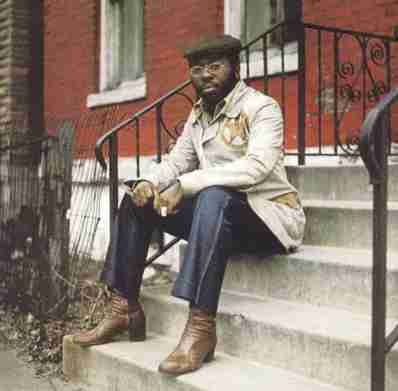Keep On Pushing: The Evolution Of Curtis Mayfield
By Chuck Sudo in Arts & Entertainment on Jun 4, 2012 7:30PM

Curtis Mayfield
Today we look at the evolution of Mayfield's music from his days with The Impressions to his final years, when he refused to let a lighting rig incident that left him paralyzed stop him from pursuing his art and message.
"Gypsy Woman" and "Amen"
Mayfield dropped out of Wells Community Academy High School early to join The Impressions, a vocal group that started out as The Roosters in Chattanooga, Tenn. who already had a young singer from Chicago named Jerry "Iceman" Butler handling lead vocals. The Impressions had a hit with "For Your Precious Love but, by 1961, Butler had departed to pursue a solo career. Mayfield wrote many of Butler's early solo hits and funneled that money back into The Impressions, and take over lead vocal duties. 1961's "Gypsy Woman" became The Impressions' first post-Butler hit.
While a reworking of the Gospel standard "Amen" was one of the earliest Impressions songs to feature Mayfield's signature falsetto and was featured prominently in the Sidney Poitier film Lillies of the Field. (Chicagoans who grew up watching WGN in the 70s and early 80s will remember Lillies of the Field was a Christmas holiday standby.)
1960s: The Impressions Soar
The Impressions' Gospel foundation served as a springboard for Mayfield's growing social and political consciousness. Songs like "Keep on Pushing," "People Get Ready" and "We're a Winner" became early staples in churches and as part of the black pride and Civil Rights movements. "We're a Winner" was a number one soul hit for The Impressions when it was released in 1967. These songs would also serve as the high water mark of Mayfield's tenure with the group.
"Keep on Pushing"
"People Get Ready"
"We're a Winner"
The 1970s: "The Gentle Genius" Arrives
Where Marvin Gaye sang to more universal concerns on What's Going On? and Stevie Wonder made the criticisms of inner city America in Innervisions more palatable with lush musical arrangements, Mayfield, who left the Impressions before the 60s concluded, spared no one in his social commentary. Songs like "(Don't Worry) If There's a Hell Below, We're All Going to Go" (with its haunting reverb on the opening line) and "We the People Who Are Darker Than Blue" were direct missives to the listener that, once we got past the color of our skin, we're all the same.
"(Don't Worry) If There's a Hell Below, We're All Going to Go"
"We Are the People Who Are Darker Than Blue"
Mayfield's early solo albums led to the masterpiece that is the Superfly soundtrack. Mayfield's approach to scoring the film also stood out in stark contrast to other "blaxploitation" soundtracks of the time (like Isaac Hayes's Shaft) by taking the main characters in the film to task for their actions. Shaft may have been a bad mother... shut your mouth. Priest, Eddie and Fat Freddie were no different than the white criminals to Mayfield. Mayfield's Superfly soundtrack served as both a score, the film's Greek chorus, and its conscience. His lyrics were unvarnished truths and accounts of inner city life. The 70s were the decade where Mayfield established himself as a master storyteller and an urban griot. Some called him a prophet.
"Pusherman"
"Little Child Running Wild"
The 80s: Looking for Hope
By the end of the 70s Mayfield was on the verge of overextending himself, with his production responsibilities, label ownership and prolific writing for other artists in addition to himself leading to some introspection and a slower working pace in the Reagan Era. Songs like "Love Me Love Me Now" from 1980's Something to Believe In and "Hey Baby" found Mayfield in a sensual mood and seeking affairs of the heart, albeit one marred in his records later in the decade by some decidedly 80s production touches.
"Love Me Love Me Now"
"Hey Baby"
The 90s: Struggle
Every rose, as the cliche goes, has its thorn. The 1990s found Mayfield going back to his 70s heyday for inspiration, which made sense since we hadn't progressed that far socially after the decade ended. Mayfield also dealt with the physical effects of the 1990 lighting rig accident that left him paralyzed from the neck down. He only recorded two albums in the 90s. The latter, 1997's New World Order was a Herculean effort, with Mayfield often recording his vocals line by line, lying on his back. As a coda, New World Order is fitting; he would be dead from the physical complications of his accident two years after its release.
"Homeless" from 1990s Take It to the Streets
"New World Order" from 1997's New World Order